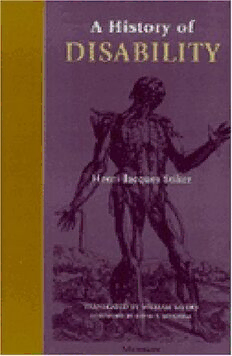Download A History of Disability PDF Free - Full Version
Download A History of Disability by Henri-Jacques Stiker, William Sayers in PDF format completely FREE. No registration required, no payment needed. Get instant access to this valuable resource on PDFdrive.to!
About A History of Disability
The increasing numbers of scholars, policy-makers, and political activists who are concerned with questions of physical and cognitive disability will warmly welcome Henri-Jacques Stiker's book, the first to attempt to provide a framework for analyzing disability through the ages. Published in 1997 in France as Corps infirmes et soci?t?s and available now in an excellent English translation, the book traces the history of western cultural responses to disability, from ancient times to the present. In this volume, Stiker examines a fundamental issue in contemporary Western discourse on disability: the cultural assumption that equality/sameness/similarity is always desired by those in society. He highlights the consequences of such a mindset, illustrating the intolerance of diversity and individualism that arises from placing such importance on equality. Importantly, Stiker does not hesitate to assert his own stance on the issues he discusses: that difference is not only acceptable, but that it is desirable, that it is necessary. The author goes beyond anecdotal history to traverse a little known history, penetrating to the heart of collective attitudes and reflecting on elements of policy. The sweep is broad; from a rereading and reinterpretation of the Oedipus myth to current legislation regarding disablity, he proposes an analytical history that demonstrates how societies reveal themselves through their attitudes towards disability, at times in unexpected ways, since the study of detail is often the best entry into the whole of a culture. The book will be of interest to scholars of disability, historians, social scientists, cultural anthropologists, and those who are intrigued by the role that culture plays in the development of language and thought surrounding the disabled. Henri-Jacques Stiker is Director of Research and member of the department of the History and Civilization of Western Societies, University of Paris VII.
Detailed Information
| Author: | Henri-Jacques Stiker, William Sayers |
|---|---|
| Publication Year: | 2000 |
| ISBN: | 9780472110636 |
| Pages: | 260 |
| Language: | English |
| File Size: | 21.497 |
| Format: | |
| Price: | FREE |
Safe & Secure Download - No registration required
Why Choose PDFdrive for Your Free A History of Disability Download?
- 100% Free: No hidden fees or subscriptions required for one book every day.
- No Registration: Immediate access is available without creating accounts for one book every day.
- Safe and Secure: Clean downloads without malware or viruses
- Multiple Formats: PDF, MOBI, Mpub,... optimized for all devices
- Educational Resource: Supporting knowledge sharing and learning
Frequently Asked Questions
Is it really free to download A History of Disability PDF?
Yes, on https://PDFdrive.to you can download A History of Disability by Henri-Jacques Stiker, William Sayers completely free. We don't require any payment, subscription, or registration to access this PDF file. For 3 books every day.
How can I read A History of Disability on my mobile device?
After downloading A History of Disability PDF, you can open it with any PDF reader app on your phone or tablet. We recommend using Adobe Acrobat Reader, Apple Books, or Google Play Books for the best reading experience.
Is this the full version of A History of Disability?
Yes, this is the complete PDF version of A History of Disability by Henri-Jacques Stiker, William Sayers. You will be able to read the entire content as in the printed version without missing any pages.
Is it legal to download A History of Disability PDF for free?
https://PDFdrive.to provides links to free educational resources available online. We do not store any files on our servers. Please be aware of copyright laws in your country before downloading.
The materials shared are intended for research, educational, and personal use in accordance with fair use principles.

